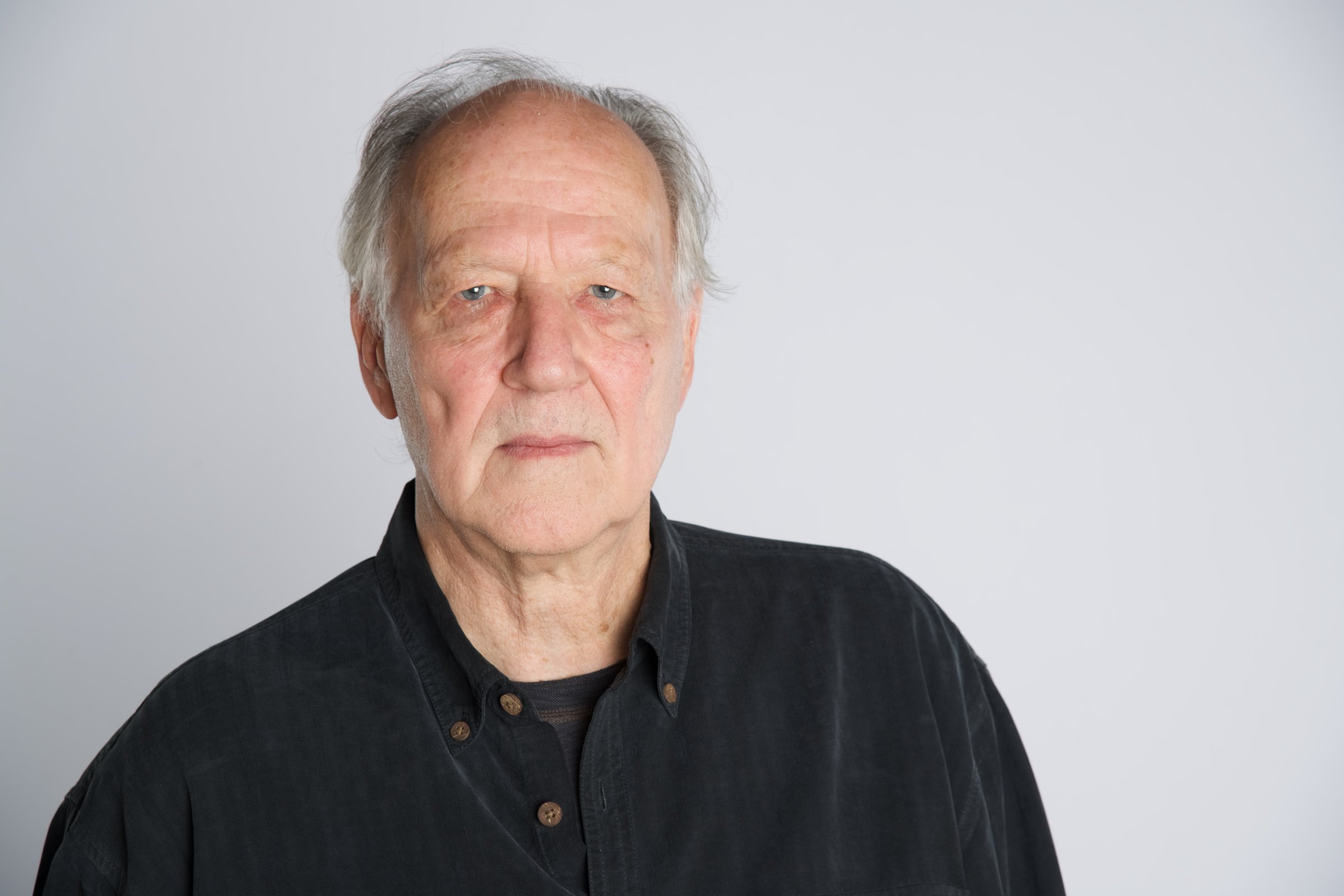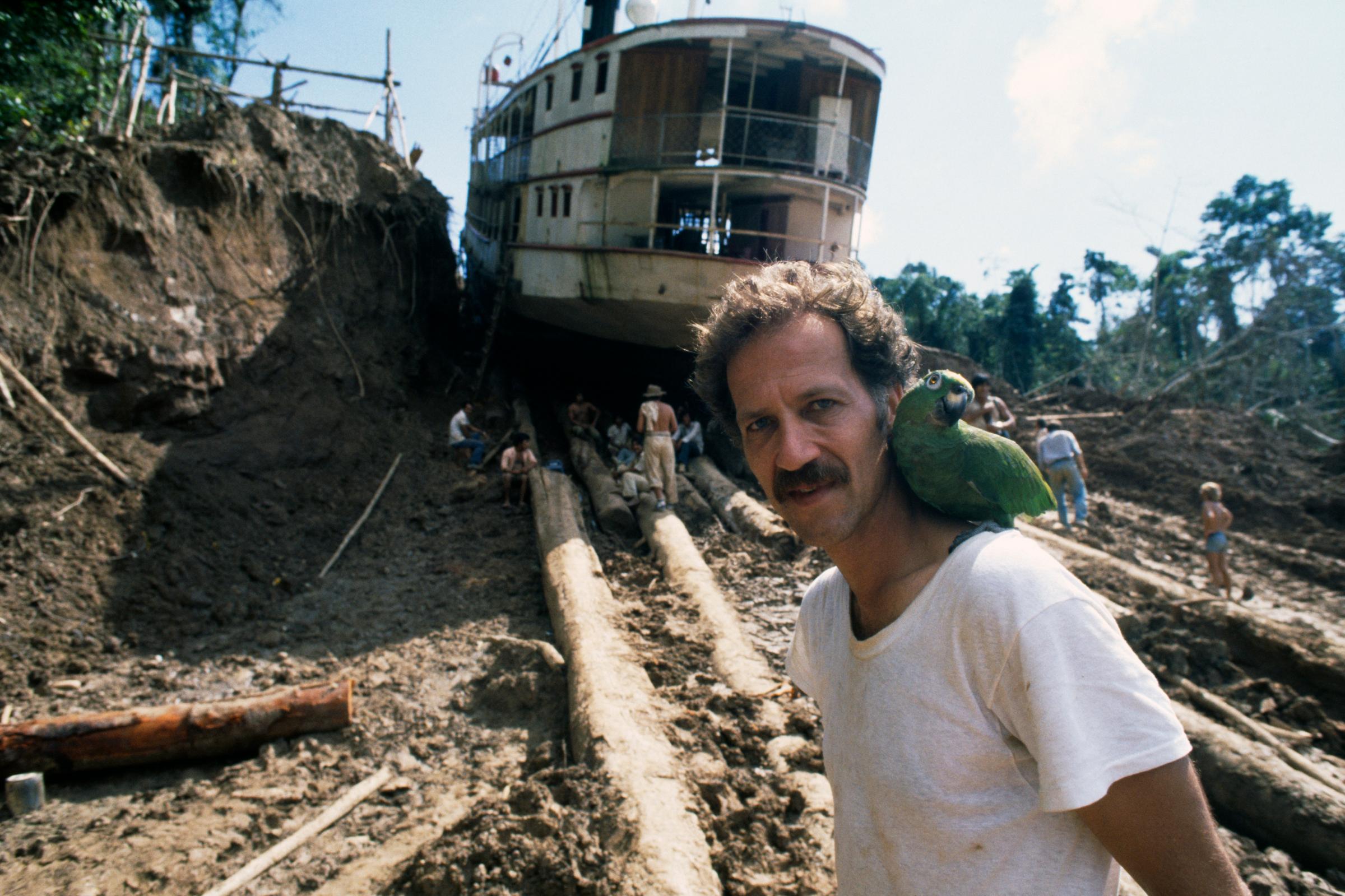
After a recent Hong Kong screening of Werner Herzog’s 2016 Netflix movie Into the Inferno, fans and aspiring filmmakers snaked up the auditorium’s aisles to ask questions of the German auteur. In button-up shirts and snapback caps, they shuffled, single file, toward the microphones. One asked about the Chinese poetry Herzog admires, another wanted to know whether he had staged elements of an almost too-good-to-be-true scene in the film—a volcano documentary—that had just played, a third queried the meaning behind Herzog’s oft-repeated adage that filmmakers must learn to “do the doable.”
Herzog, now 75, was sitting one leg draped over the other in front of a gigantic billboard. It showed him at the lip of a volcano wearing a hazard suit—somewhere between a space suit and a beekeeper’s outfit—as smoke plumed in the background. Onstage, the director cocked his head and listened carefully to the questions. Doing the doable has to do with “a sense for the real world, and practically functioning in it,” he said in the famous Germanic voice he has lent to The Simpsons and American Dad.
By way of example, Herzog told of how he came across the 400 monkeys he had bought for his 1972 epic Aguirre the Wrath of God on their way out of Lima. He had paid a deposit for the monkeys but chanced upon them being loaded onto a plane, en route to another buyer. “I immediately shouted at the transport people, I said ‘I’m here, the veterinarian, where are the documents for the vaccinations?’” The ruse apparently worked and Herzog made off with the monkeys, eventually paying the balance to the trader who’d tried to swindle him. “The skunk would have disappeared with half of my money and I wouldn’t have a single monkey,” he said.
‘It would only be a self-centered stupidity’
It has been half a century since Werner Herzog released his first full-length feature, Signs of Life (1968) which depicts a wounded German WWII paratrooper losing his mind on a torpid Greek island. In the intervening years, he has directed more than 70 films, operas and TV shows, acted in a handful of movies, written several books, and won prizes at Cannes, Sundance, and Venice—though still not an Oscar.
“I’m quite aware that the average working life of a filmmaker, statistically, is fairly short,” he tells TIME. “You can play the cello at age 90 and still be dignified and still create great music. Cinema is much more treacherous.” Even Orson Welles was swallowed by Hollywood after spending lavishly and going broke, Herzog says, adding that he, by contrast, he has been attentive, vigilant, and avoided the fatal mistakes.
But in the popular imagination, Herzog is hardly known for his restraint. The Internet abounds with listicles detailing his macho feats of cinema. Besides the Peruvian monkeys, there’s the story of how he leapt into a cactus after making a bet in Even Dwarfs Started Small (1970); how he was caught in the middle of a South American border war (“it is exhilarating to be shot at without success” he told TIME in 2009, paraphrasing Winston Churchill); and how at one stage in Aguirre: the wrath of God he directed his lead, Klaus Kinski, at gunpoint.
“All these things do not count anymore once a film is done,” Herzog says when asked whether he makes deliberately arduous works. “When you’ve really created a good film, none of the actors or crew members would ever mind [the difficulty]. They’re proud: ‘Yes, we went with you on these rafts through the rapids, but it’s wonderful that we did it.'”
Most famously difficult is 1982’s Fitzcarraldo, about a rubber baron who, in Sisyphean style, drags a 320-ton steamship over a mountain in order to build an opera house in the jungle. The long, fraught years of production even have their own documentary, Les Blank’s The Burden of Dreams (1982), which centers on Herzog and his crew’s own logistical struggles with the steamship. “Both the filmmaker and the fictional character are portrayed as grandiose dreamers attempting the impossible,” critic Mark Richardson wrote, “you see both these movies, time passes, and you kind of forget which scenes happened in the fiction film and which scenes happened in the documentary.”

Herzog is a brilliant raconteur but these days can be a reluctant one. His notes on Fitzcarraldo’s nightmare production, Conquest of the Useless (2009), his televised interviews, and more recently, his online MasterClass teaching series, are chock full of fabulous tales. Yet there’s a certain weariness to how he recounts oft-recalled anecdotes for public consumption. When Rescue Dawn (2006) star Christian Bale had the temerity to suggest his director be the subject of a documentary, Herzog dismissed the idea instantly. “It would only be a self-centered stupidity, and I think as a decent human being you just don’t allow it,” he says.
‘I’m still full of stories’
Herzog’s most recent documentaries Lo and Behold: Reveries of a Connected World, and Into the Inferno, both released 2016, embark on what appear to be very different explorations of human nature. The former deals with the Internet and artificial intelligence, and features an appearance from Elon Musk, who is asked whether “the Internet dreams of itself.” The latter follows a Cambridge University volcanologist to places where active volcanoes have spawned gods: in Vanuatu, Herzog meets islanders who venerate an obscure American airman they believe dwells in the magma; in North Korea, he films students paying obeisance to Mount Paektu, whose origin myths have been co-opted by the DPRK leadership. Herzog’s most recent film is a 35-minute YouTube spot on the dangers of texting while driving. Backed by U.S. cell phone giants, it has been viewed millions of times.
Read more: Werner Herzog on Why You’ll Never Find Him on Facebook or Twitter
As different as the topics of the three movies seem, like Fitzcarraldo and The Burden of Dreams they bleed into each other. What impressed Herzog most about North Korea he says, was how cut off it is from the outside world: information is not the “cloud of particles or mist around the planet” we conceive it to be but “earthbound servers and routers that you can switch off or even destroy.”
From first to last, the precariousness of civility has been a perennial theme for Herzog, who says being born in Germany during the Second World War gave him “sensitive antenna” to humankind’s capacity for barbarism. We have always been, and we always will be susceptible to propaganda and manipulation, he says. Nature is no bucolic retreat, either: it is the fever-madness of the jungle, the hunger of wild animals, and the rumble of magma under the earth. The only remedy is “a certain fundamental understanding of the real world.” Read books, not tweets, Herzog tells young filmmakers. Don’t wait on grants. Earn production money working the door of a strip club if you have to. If you don’t know what to shoot, pick a random compass direction and walk 100 miles from your house.
“I’m still full of stories,” Herzog says, “I want to tell them and I want to continue doing what gives me so much joy—filmmaking.” A screenplay normally takes Herzog less than a week to write, he claims, and once he has entered the “spirit and the soul” of it, an almost volcanic alchemy occurs: “I see an entire film in front of my face. I see it as if I were sitting in a cinema, and I do the work of somebody who only copies what he sees and hears.”
More Must-Reads from TIME
- Cybersecurity Experts Are Sounding the Alarm on DOGE
- Meet the 2025 Women of the Year
- The Harsh Truth About Disability Inclusion
- Why Do More Young Adults Have Cancer?
- Colman Domingo Leads With Radical Love
- How to Get Better at Doing Things Alone
- Michelle Zauner Stares Down the Darkness
Write to Joseph Hincks / Hong Kong at joseph.hincks@time.com